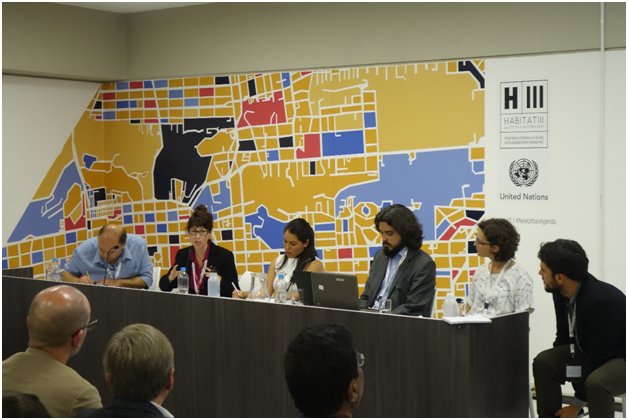
HABITAT III – Cycling Promoted as a Means of Implementing the New Urban Agenda
This October in Quito, Ecuador the Habitat III conference saw 30,000 participants attend – one of the largest UN conference to-date. The goal of the conference was to decide on the future of cities. ECF and WCA were on site, represented by Secretary-General Bernhard Ensink, Global Policies Director Marcio Deslandes and Global Policies Coordinator Zoé Kruchten. Together with local cycling associations and international partnerships, cycling was once again promoted on the global stage - it was included to the New Urban Agenda and mentioned five times!
A resounding cry for more sustainable and equitable cities
The preparation for the Habitat III and its outcome document – the New Urban Agenda – was a process of over two years. With more than 50% of people living in urban areas and urbanization on the course to increase rapidly, cities are seen as the new battleground for sustainability and equity. The New Urban Agenda was agreed upon by all 193 members of the United Nations in the months leading to the Habitat III conference, and during the four-day event in Quito no amendments were made. The 170 country delegations that were present signed the document – a non-binding agreement on the future of cities. European Cyclists’ Federation (ECF) and World Cycling Alliance (WCA) were there every step of the way, attending the World Urban Forum 7, Preparatory Committee I, Preparatory Committee II, Preparatory Committee III and the European Habitat in Prague. Alongside continued and successful collaborations, cycling made it into the New Urban Agenda and in a variety of ways.
Cycling forward for better cities
In comparison with the previous editions of this conference (Habitat I – 1976 Vancouver, Habitat II – 1996 Istanbul), cycling is well represented. Mentioned five times, a holistic view of cycling has taken centre stage. Cycling is seen as a means for social inclusion, equity, sustainability and accessibility in our future cities. Now that the New Urban Agenda has been adopted, its implementation becomes everyone’s business – states, regions, and cities. Stakeholders such as ECF and WCA play an equally important role, as the promotion of cycling can be a clear means for implementing the New Urban Agenda. This was the main objective of the ECF/WCA delegation in Quito: to show how successful collaboration and promotion of cycling is indeed the way forward for better cities.
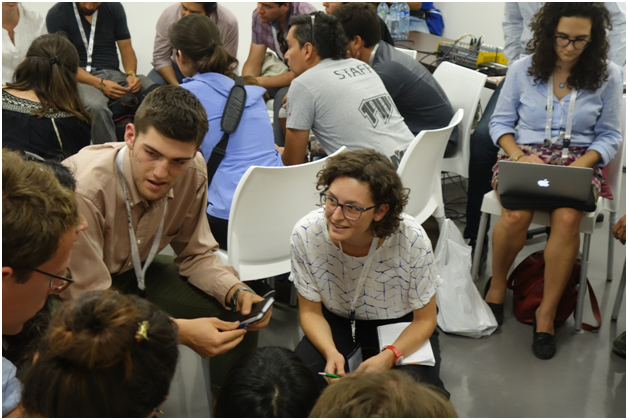
At a session organized by the European Commission, Corina Cretu - EU Commissioner for Regional Policy - stated that the EU Urban Agenda is in line with the global New Urban Agenda; and the mayor of Utrecht (the Netherlands), Jan van Zanen, stressed that air quality and the exchange of experiences are important topics in both agendas. Bernhard Ensink, in his intervention at that session, ambitions and efforts of the EU and EU member states like The Netherlands that collaborate worldwide on city development. Ensink additionally emphasized that civil society organizations can play an important role in the exchange of experience and worldwide collaborations and offered ECF as a willing partner.
International partnerships, exhibition and networking event
Prior to the conference, we took part in an ActiveLab organized in partnership with Biciaccion (Ecuador) and Bike Anjo (Brazil) as part of the YoutHab Conference. The hands-on approach involved encouraging interest in the city through mapping perceived issues for cyclists and infrastructure through a specially designed app. A part of this was to address the issue of data collection. Local association and WCA member Biciaccion plans to use the data collected to analyze it and present it as a tool to support their further bicycle promotion.
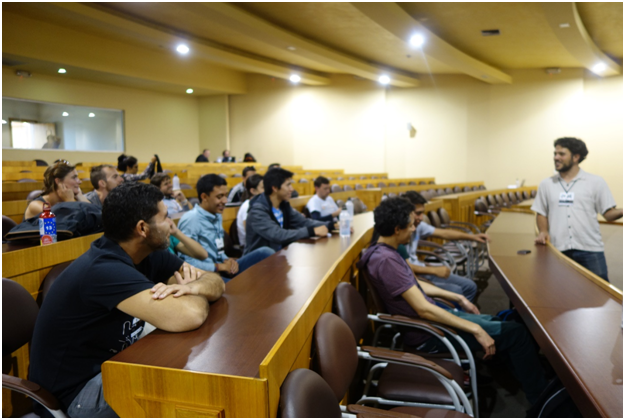 The exhibition hall of Habitat III, open to the public, was a great melting pot of delegates, stakeholders, school children and locals. ECF and WCA shared a booth with ECF’s Cycling Industry Club (CIC) member NextBike. There many people took interest in NextBike’s public bike sharing system, as well as in ECF/WCA’s work on the global goals and our reports and studies. With the promotion of World Bicycle Day, delegates and locals alike were happy to visualize their support with an “I Support World Bicycle Day” portrait. Presentations by the team running the booth created a lot of discussion and movement.
The exhibition hall of Habitat III, open to the public, was a great melting pot of delegates, stakeholders, school children and locals. ECF and WCA shared a booth with ECF’s Cycling Industry Club (CIC) member NextBike. There many people took interest in NextBike’s public bike sharing system, as well as in ECF/WCA’s work on the global goals and our reports and studies. With the promotion of World Bicycle Day, delegates and locals alike were happy to visualize their support with an “I Support World Bicycle Day” portrait. Presentations by the team running the booth created a lot of discussion and movement.
Through our continued collaboration with Sustainable Low Carbon Transportation Partnership (SLoCaT), of which ECF/WCA are members, allowed for us to attend and present at Quito Transport Day. Marcio Deslandes presented on cycling during the Transport Day, an event meant to group together the transport sector alongside the proceedings of Habitat III. SLoCaT unveiled their Memorandum of Understanding with UN-Habitat on tracking the ‘transport’ parts of the New Urban Agenda.
On the last day of the conference, we organized an official networking event. A huge success, we had over 100 participants in our small but cozy room. Starting with an overview of cycling on the global level, we went into details of implementation using the example of the Hyderabad metro rail and bike sharing system project, a collaboration of Hyderabad Bicycling Club and NextBike. From there, we created four discussion groups on Health, Climate, Age/Gender/Access for all, and Behaviour Change. These discussions were brought to a lively panel debate, joined by a representative from Belo Horizonte, Brazil, to speak about the governance aspect.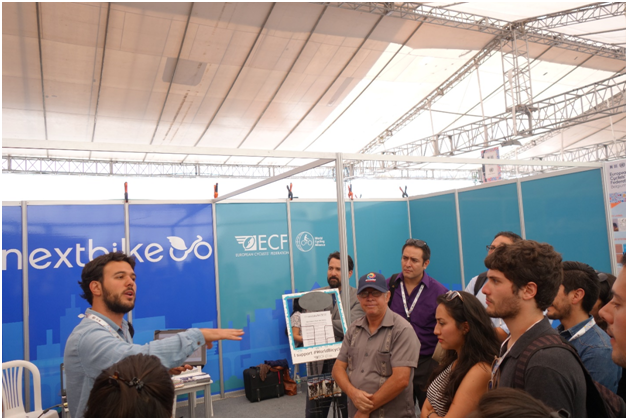
What do we take away from Habitat III?
New contacts, new collaborations, new interests in cycling promotion around the world. “It was great to learn during the trip about the investments the city of Quito is doing in cycling, electric assisted bicycles and the integration of cycling with the rapid transit and cable cars” say Bernhard Ensink about the trip. We were very happy to spend time with some of our new World Cycling Alliance members (BiciRed, Biciaccion) and continue building our relationships with them. Clearer links and understandings of how the New Urban Agenda fits into our advocacy work at the EU and global level were key steps in moving forward with cycling promotion. The next steps are to combine this information into powerful advocacy tools for our members around the world.
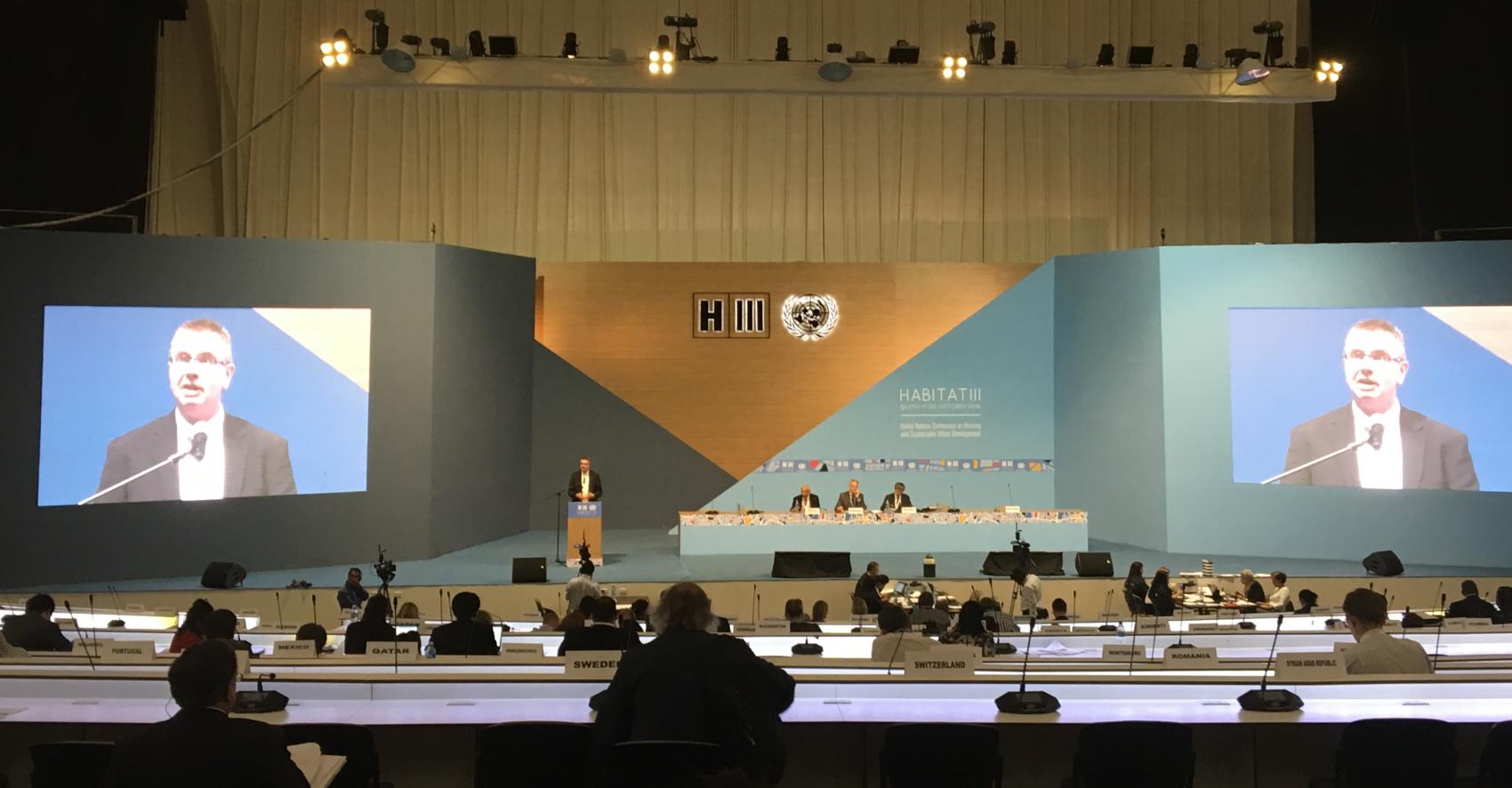
ECF Stakeholder Statement during the Plenary at Habitat III (link to statement article).
Thanks to everyone who supported our work in this: Transporte Ativo, Bike Anjo, Biciaccion, NextBike, Laboratorio de Cambio Social, Hyderabad Bicycling Club, HealthBridge Canada, YoutHab Conference and the many others.
Network/Project Involved:
Contact the author
Recent news!
Upcoming events
Contact Us
Avenue des Arts, 7-8
Postal address: Rue de la Charité, 22
1210 Brussels, Belgium









